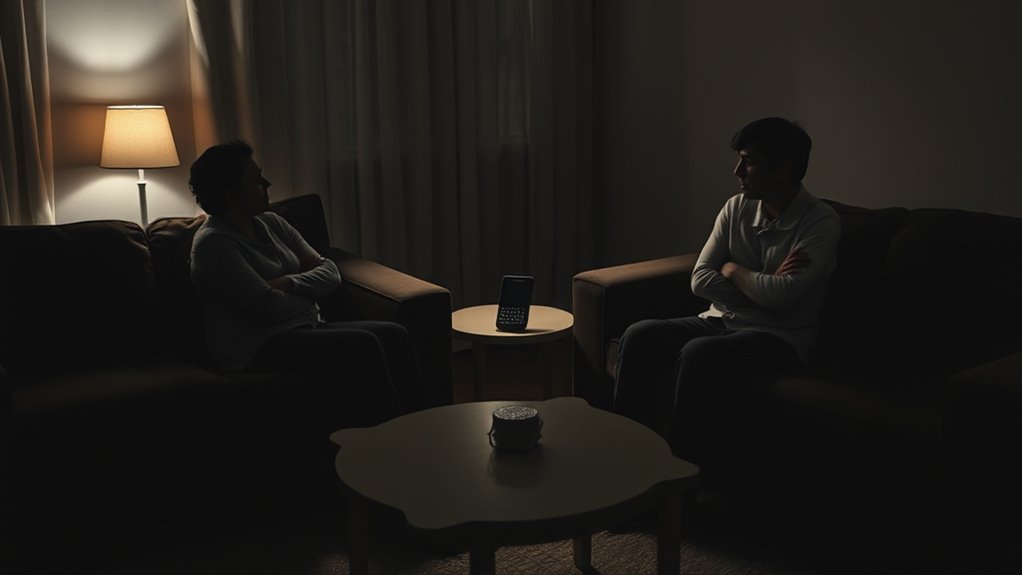The most common relationship mistakes include poor communication, taking your partner for granted, and ignoring external stresses that impact your bond. You might not express appreciation enough or overlook emotional signs, allowing distress to build up. Respect and boundaries are often neglected, leading to misunderstandings and resentment. If you neglect emotional well-being and fail to address issues early, your connection can suffer. Focusing on these areas helps strengthen your relationship and avoid these pitfalls—learn more about how to improve your relationship now.
Key Takeaways
- Poor communication and emotional neglect lead to misunderstandings, resentment, and emotional distance.
- Taking each other for granted diminishes appreciation, causing emotional disconnection and weakened bonds.
- External stressors like work and health issues increase tension and reduce intimacy if not managed openly.
- Failing to show mutual respect and recognize warning signs undermines trust and prevents early intervention.
- Delaying addressing conflicts and neglecting emotional well-being escalate issues, risking long-term relationship damage.
Neglecting Effective Communication

Neglecting effective communication can considerably harm your relationship’s satisfaction and stability. When you fail to communicate clearly and constructively, negative patterns like frequent conflicts and withdrawal tend to grow. A lack of open dialogue can also prevent partners from understanding each other’s needs, leading to misunderstandings and resentment. This can create an environment where dissatisfaction thrives, even if you’re unaware of it. Couples who communicate well, especially during stressful times, report higher satisfaction because they resolve issues efficiently and build trust through active listening and empathy. Conversely, poor communication can hinder problem-solving and deepen misunderstandings. Over time, these issues undermine connection and happiness. While positive interactions matter, addressing negative communication patterns is crucial to maintaining a healthy relationship. Recognizing and improving how you communicate is a vital step toward fostering satisfaction and preventing relationship deterioration. Additionally, understanding the importance of effective communication strategies can help couples navigate conflicts more successfully. Incorporating active listening techniques can further enhance mutual understanding and reduce misunderstandings, fostering a stronger emotional connection. Developing trustworthiness of your partner through honest and open dialogue also supports long-term relationship health. Building a foundation of emotional safety encourages both partners to share openly without fear of judgment or retaliation.
Taking Your Partner for Granted

Over time, partners can become so comfortable with each other that they start to take one another for granted. Routine familiarity can breed complacency, making you overlook your partner’s efforts or kindness. Daily distractions from work, family, and social obligations pull your attention away from nurturing the relationship. When you stop actively noticing your partner’s needs and contributions, feelings of neglect can develop. Small acts of kindness and appreciation may fade, leading to emotional disconnection and resentment. Without intentional effort, the bond weakens, and intimacy declines. Recognizing this pattern is essential. Rebuilding appreciation requires conscious actions like regular check-ins, expressing gratitude, and spending quality time together. Open communication is vital for addressing underlying issues and strengthening your connection. Building emotional intimacy through meaningful conversations can help prevent taking each other for granted and foster deeper understanding. Paying attention to cost and budgeting considerations in your relationship can also ensure shared financial goals are met, reducing stress and conflict. Incorporating automation in business and other technological tools can streamline your routines, freeing up time to focus on your partner. Developing a spiritual connection can further deepen your bond and bring new levels of understanding and love. Mutual respect and open communication are fundamental to prevent taking each other for granted and maintaining a healthy, fulfilling relationship.
Ignoring External Pressures and Stressors

While making an effort to appreciate your partner’s daily kindness is important, it’s equally essential to recognize and address external pressures that can strain your relationship. Job stress, financial difficulties, family interference, health issues, and social factors can all create significant tension. Recognizing external pressures and their impact on emotional well-being can help couples develop more effective coping strategies. Understanding how water-based therapy can reduce stress might offer additional relief. Additionally, incorporating innovative AI-powered stress management tools can assist couples in identifying stress patterns and developing personalized coping techniques. These tools leverage creative practice and other technological advancements to provide tailored feedback for stress reduction. Ignoring these stressors often leads to decreased communication, increased conflict, and a negative view of your relationship. Over time, stress can diminish intimacy and impair your problem-solving abilities.
This ongoing neglect tests your relationship’s resilience, potentially causing long-term damage. To prevent this, communicate openly about external pressures, seek therapy if needed, and develop joint strategies to manage stress.
Acknowledging external challenges fosters unity, strengthens your connection, and helps maintain a healthier, more resilient relationship.
Failing to Show Mutual Respect

Failing to show mutual respect can silently weaken your relationship by undermining trust and emotional connection. When you ignore your partner’s feelings or dismiss their emotional needs, it creates hurt and distance.
Open communication is essential for expressing and understanding emotions, but neglecting this can erode intimacy. A lack of respectful dialogue can cause ongoing misunderstandings and resentment. Developing emotional intelligence can help partners recognize and respond to each other’s feelings more effectively.
Disregarding boundaries also signals disrespect, making your partner feel insecure and undervalued. Respecting personal limits fosters trust and safety, encouraging honest sharing.
Additionally, unbalanced communication—dominating discussions or dismissing opinions—destroys mutual respect. Recognizing and addressing relationship warning signs early can prevent long-term damage and promote healthier interactions.
Supporting each other’s goals and growth shows you value their individuality. Incorporating mutual respect into your interactions can significantly improve mutual understanding and respect.
When you fail to uphold respect, toxic behaviors can creep in, further damaging your bond. Practicing mindfulness techniques, such as active listening, can help partners stay present and attentive during conversations, strengthening mutual respect.
Ultimately, showing respect is the foundation for a resilient, healthy relationship built on trust, understanding, and genuine care.
Allowing Emotional Distress to Fester

Allowing emotional distress to fester can silently erode your relationship’s foundation. When conflicts remain unresolved, they build up, creating resentment and emotional distance.
Unchecked emotional distress quietly damages your relationship’s core.
Communication breakdowns make it harder to understand each other’s needs, leaving both partners feeling misunderstood and isolated. External pressures like work stress can intensify these feelings, making it even more difficult to address issues promptly.
If you ignore signs like withdrawal, irritability, or persistent anxiety, the distress deepens, risking long-term dissatisfaction. Over time, unresolved emotional pain can lead to depression, anxiety, and physical health problems for both of you. Recognizing early warning signs and emotional support can help prevent issues from escalating further. Additionally, understanding the importance of home essentials can create a more comfortable environment that fosters open communication and emotional healing. Being aware of these relationship dynamics helps couples intervene before issues become unmanageable. Addressing these issues promptly and seeking professional guidance can significantly improve relationship resilience. The longer these issues go unaddressed, the harder it becomes to rebuild trust and connection. It’s essential to confront emotional distress early, before it permanently damages your relationship.
Overlooking the Importance of Appreciation

Recognizing the importance of appreciation is essential for maintaining a healthy and fulfilling relationship. When you regularly express gratitude, you create a positive environment that brings out your partner’s best qualities. It validates their actions, making them feel seen and valued, which boosts their self-esteem and overall well-being.
Overlooking appreciation can lead to emotional distance, misunderstandings, and frequent arguments, as your partner may feel neglected or underappreciated. This can diminish enthusiasm and weaken your emotional bond.
To prevent this, use verbal affirmations, acts of service, and small gestures to show genuine appreciation. Regularly discussing what you value in each other helps foster a culture of gratitude, strengthening your connection and making your relationship more resilient over time.
Frequently Asked Questions
How Can Couples Improve Communication During Conflicts?
To improve communication during conflicts, you should focus on active listening, giving your partner your full attention without distractions.
Use “I” statements to express your feelings clearly and avoid blame.
Keep your tone soft at the start, and practice de-escalation techniques to stay calm.
Regularly check in with each other, maintain open channels of communication, and consider scheduling dedicated times to discuss issues constructively.
This approach fosters understanding and healthier dialogue.
What Are Signs of Taking a Partner for Granted?
You mightn’t realize you’re taking your partner for granted when you stop thanking them or overlook their efforts.
If you’re ignoring their needs or dismissing their feelings, it’s a clear sign.
When plans are made without their input, and you prioritize yourself more than them, you’re casually slipping into this trap.
Spending more time with others or using them just for support shows you’re not truly appreciating what they bring to your life.
How Do External Pressures Uniquely Impact Relationship Health?
External pressures, like job stress or societal expectations, can strain your relationship by draining your emotional resources and increasing criticism. They may cause you to become less patient, less attentive, and more reactive.
These pressures can disrupt your usual interaction patterns, leading to misunderstandings and hostility. To protect your relationship, communicate openly, set boundaries, and work together to build resilience against external stressors, ensuring your connection stays strong.
In What Ways Does a Lack of Respect Manifest Daily?
You might think disrespect only shows in big fights, but it often appears daily in small ways. You dismiss your partner’s opinions, ignore their boundaries, or minimize their feelings.
Insensitive comments or subtle sarcasm can make them feel undervalued. These behaviors chip away at trust and connection over time, leading to emotional distance.
Recognizing these signs helps you nurture respect daily, strengthening your relationship instead of letting disrespect quietly erode it.
How Can Emotional Distress Be Effectively Addressed Before It Worsens?
When you notice emotional distress building, act early by practicing active listening and expressing vulnerabilities openly.
Validate your partner’s feelings and develop empathy to strengthen your connection.
Use mindfulness and self-care to manage your emotions, and consider seeking professional help if needed.
Setting healthy boundaries and developing coping strategies can prevent issues from escalating.
Addressing concerns promptly creates a supportive environment where both of you feel understood and secure.
Conclusion
Remember, a healthy relationship is like tending a delicate garden; neglecting communication or appreciation lets weeds grow, choking out love. When you take your partner for granted or ignore external stresses, it’s like leaving the garden unwatered and overrun. But with mutual respect, open talks, and gratitude, you nurture a vibrant, blooming connection. Keep watering those roots daily, and watch your relationship flourish, resilient against the storms that life throws your way.










